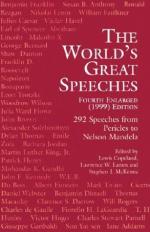
|
| Name: _________________________ | Period: ___________________ |
This test consists of 15 multiple choice questions and 5 short answer questions.
Multiple Choice Questions
1. In the speech Dunkirk by Winston Churchill, which country was the aggressor?
(a) Germany.
(b) The United States.
(c) Japan.
(d) Russia.
2. Who was imprisoned during World War 2 for a firm stance taken against India's participation in the war without a guarantee of independence?
(a) Dag Hammarskjold.
(b) Jawaharlal Nehru.
(c) Oswaldo Aranha.
(d) Mohandas Ghandi.
3. Who worked hard to give New York a progressive, vital and constructive administration?
(a) John William Gardner.
(b) Richard Nixon.
(c) George Wald.
(d) John Vliet Lindsay.
4. According to Haile Selassie, which country was the first to be threatened by Fascist Italy?
(a) Somalia.
(b) Algeria.
(c) Ethiopia.
(d) France.
5. According to Anthony Eden's speech "A Firm Policy", what should the objective of foreign policy be?
(a) Prevention of hunger.
(b) World domination.
(c) Economic growth.
(d) Maintenance of peace.
6. What kind of trees did Henry Ward Beecher transplant?
(a) Oak trees.
(b) Magnolia trees.
(c) Peach trees.
(d) Walnut trees.
7. What battleship did the Japanese formally surrender to the United States on?
(a) Enterprise.
(b) Missouri.
(c) Washington.
(d) Arizona.
8. What organization required a nuclear backdrop far beyond the capability of any Western European nation to supply?
(a) NAACP.
(b) Peace Corps.
(c) NATO.
(d) United Nations.
9. The arms race was between the United States and what country?
(a) France.
(b) U.S.S.R.
(c) England.
(d) Germany.
10. According to Owen D. Young, what did not "exist in a form of powder, a mere mass of incoherent particles"?
(a) Culture.
(b) Society.
(c) Peace.
(d) Individuality.
11. Who was a lawyer and railroad executive that was known for his after-dinner speeches?
(a) George Graham Vest.
(b) Joseph Hodges Choate.
(c) Chauncy Mitchell Depew.
(d) Andrew Carnegie.
12. Who was a Democratic candidate for President in two consecutive elections, 1952 and 1956?
(a) Harry Truman.
(b) Lyndon B. Johnson.
(c) John F. Kennedy.
(d) Adlai Stevenson.
13. Who was the leader and Presidential candidate for the socialist party for many years?
(a) Norman Thomas.
(b) Harry Truman.
(c) Henry Wallace.
(d) Dorothy Thompson.
14. Who believed that the Canadian people entered WWII on their own free will?
(a) Winston Churchill.
(b) W.L. Mackenzie King.
(c) Clement R. Attlee.
(d) Anthony Eden.
15. Who was an English novelist that spoke about "English Friendship for America"?
(a) Ralph Waldo Emerson.
(b) James Russell Lowell.
(c) Julia Ward Howe.
(d) Charles Dickens.
Short Answer Questions
1. What was founded on the exploitation of the weaknesses of the human heart?
2. Who was the first person to fly alone across the Atlantic Ocean?
3. According to the speech "Powers of the President", what was the President responsible for?
4. What continent was the topic of Henry Morton Stanley's speech?
5. Who was the United States' representative to the United Nations Atomic Energy Commission and was a valuable presidential adviser?
|
This section contains 450 words (approx. 2 pages at 300 words per page) |

|




